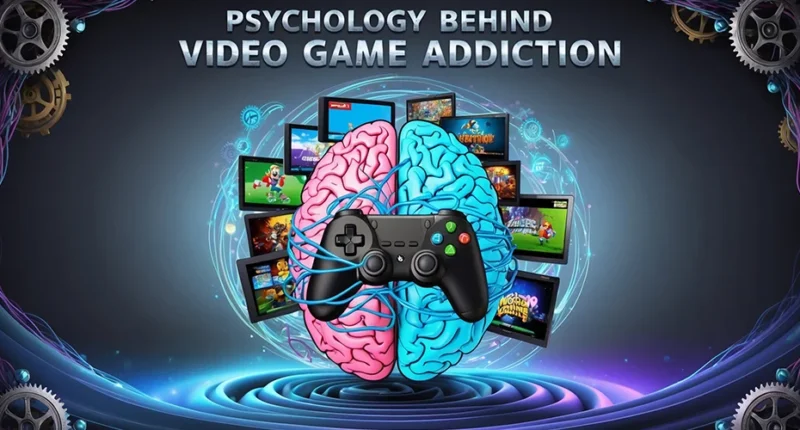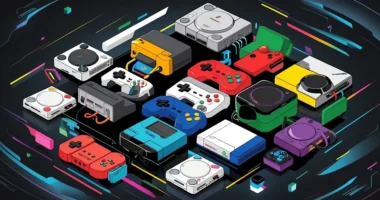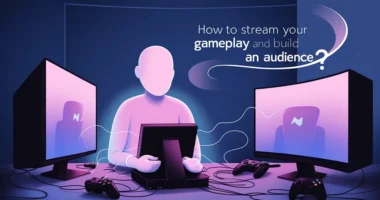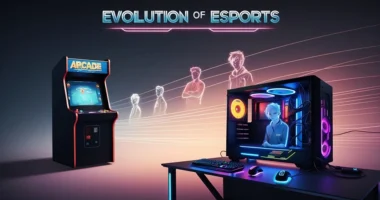Table of Contents
Video games have become a central part of many people’s lives, offering entertainment, social connection, and even a way to unwind. However, for some, playing games can go beyond a fun hobby and turn into a form of addiction. The psychology behind video game addiction is complex and involves a mix of emotional, cognitive, and social factors. Understanding why some people get hooked on video games can help in addressing the issue and finding ways to maintain a healthy balance.
The Appeal of Video Games
One of the primary reasons people get drawn to video games is the sense of reward. Many games are designed to keep players engaged by offering rewards such as points, new levels, achievements, or in-game items. These rewards tap into the brain’s dopamine system, which is responsible for feelings of pleasure and satisfaction. When players achieve something in a game, their brains release dopamine, making them feel good and encouraging them to continue playing. This cycle of rewards is a powerful motivator and can lead to players spending hours immersed in their games.
Escapism and Stress Relief
Video games also offer an escape from the stresses of everyday life. Many players turn to video games as a way to forget about their problems or to relax after a long day. Video games provide an immersive world where players can control the action, solve challenges, and experience a sense of accomplishment. This sense of control and escape can be particularly appealing to those dealing with anxiety, depression, or other mental health issues. In some cases, people may become so reliant on gaming to cope with their emotions that it leads to unhealthy habits, such as neglecting responsibilities or social interactions.
Social Interaction and Community
In recent years, many video games have included multiplayer features, allowing players to connect with friends or strangers from all over the world. The sense of community and social interaction can make gaming even more addictive. Games like Fortnite, League of Legends, and Among Us have created massive online communities where players form friendships, join teams, and even participate in large tournaments. This social aspect of gaming can lead to players spending more time in-game, feeling connected to others and sometimes even neglecting their real-life relationships. For some, the online friends they make in games become just as important, if not more important, than the people in their immediate social circles.
The Role of Game Design
Game developers use specific design techniques to make their games as engaging as possible. Features like leveling up, unlocking new items, and completing quests are meant to keep players coming back for more. Some games also have “loot boxes” or microtransactions that encourage players to spend real money for virtual rewards. These elements create a feeling of progression and can make it hard for players to stop once they’ve invested time or money into the game. Some games even have “grinding” mechanics, where players need to repeatedly perform simple tasks to earn rewards, which can be highly addictive because of the steady, predictable payoff.
The Psychological Impact of Video Game Addiction
While video games are designed to be fun, they can sometimes have a negative impact on a player’s mental and physical health. People who become addicted to gaming may experience problems such as sleep deprivation, poor nutrition, and lack of exercise. In more severe cases, video game addiction can lead to depression, anxiety, and other mental health issues. Players may feel a sense of guilt or frustration when they realize how much time they are spending on games, but the desire to continue playing can be too strong to resist.
Another psychological effect of gaming addiction is the inability to prioritize real-world responsibilities. People who are addicted to video games may neglect work, school, or family obligations in favor of playing. This can cause problems in personal relationships, as family members or friends may feel ignored or upset by the player’s behavior.
Recognizing the Signs of Video Game Addiction
It’s important to recognize when gaming becomes a problem. Some signs of video game addiction include:
- Spending more time gaming than intended
- Neglecting responsibilities such as work, school, or relationships
- Feeling restless or irritable when not playing
- Using gaming to escape from real-life problems or emotions
- Feeling a sense of loss of control over the amount of time spent on games
- Lying about how much time is spent playing games
If any of these signs are present, it may be time to reassess gaming habits and consider taking steps to regain control.
Finding Balance
The key to avoiding video game addiction is moderation. It’s important to remember that video games can be a fun and rewarding form of entertainment when enjoyed in balance with other activities. Setting time limits on gaming, prioritizing real-world responsibilities, and taking breaks can all help prevent addiction. Additionally, talking to a mental health professional can provide support if gaming becomes a way to cope with deeper emotional issues.
In some cases, seeking professional help might be necessary to address underlying problems such as anxiety, depression, or social isolation that contribute to gaming addiction. Therapy or counseling can help players understand the root cause of their addiction and develop healthier coping mechanisms.
Conclusion
Video game addiction is a complex issue, but understanding the psychology behind it can help in managing it effectively. The rewards, escapism, and social connections offered by video games make them a powerful force in people’s lives, but it’s important to maintain a healthy balance. By recognizing the signs of addiction and taking steps to manage gaming habits, it’s possible to enjoy video games in a way that doesn’t interfere with real-life responsibilities and well-being.











